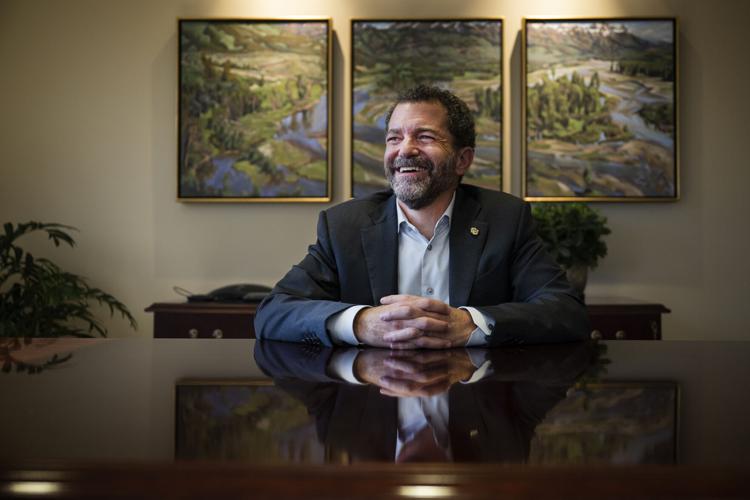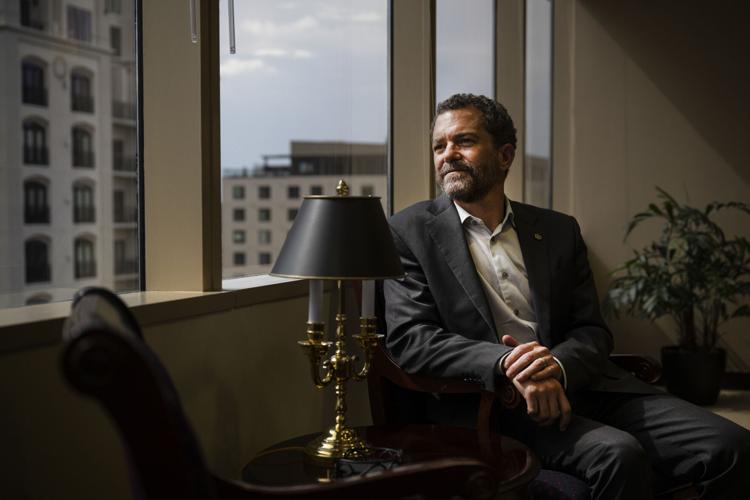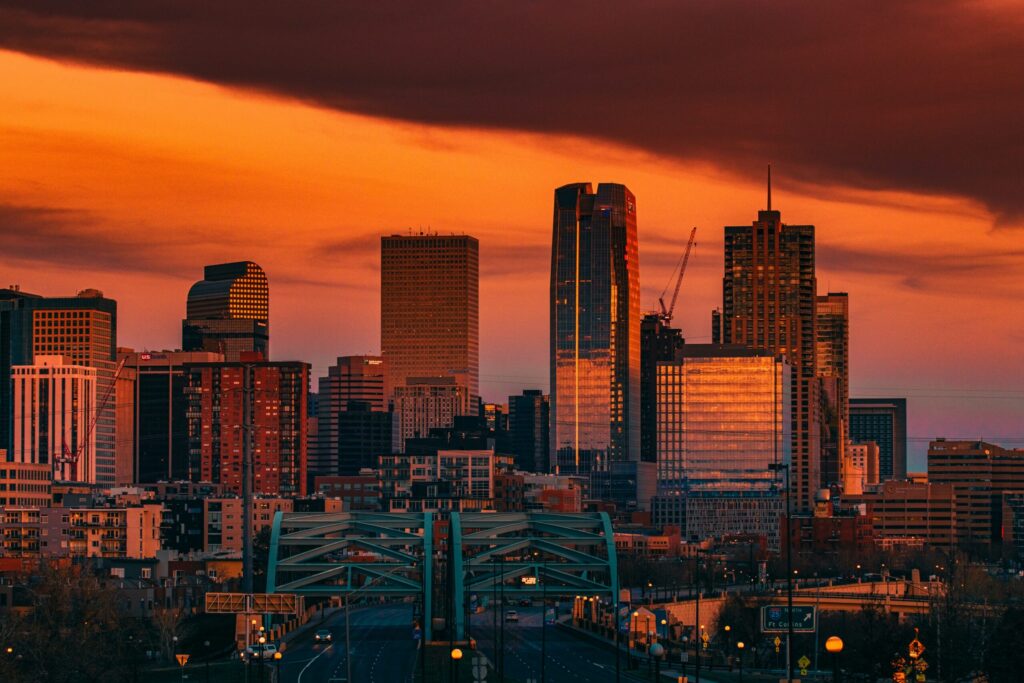A conversation with Todd Saliman about the future of the University of Colorado
Todd Saliman was named president of the University of Colorado system in late April.
Saliman, 55, has worked for the university for 10 years, serving as its chief financial officer and vide president for government relations and strategy since 2012.
He also served in the Colorado House of Representatives from 1995 to 2003 and then served in Cabinet-level positions for Govs. Bill Ritter and John Hickenlooper.
In a wide-ranging interview with The Denver Gazette, Saliman talked about his new role and his plans for the university’s four campus system. This interview has been edited for length and clarity.
What are some of the biggest challenges the system is facing right now?
So our challenges and our opportunities are kind of the same. When I think about the work that we need to do, I really put it into five buckets. One is student success, another is reflecting the diversity of Colorado. Another is research, scholarship and creative work. Another is really connecting and serving the community of Colorado. And the last bucket is health care and health care workforce. I think we have challenges and opportunities in all of those areas and I don’t really think about it in terms of the one grand challenge or anything like that because it’s all related and it all connects. But when I think about where I want the University of Colorado to be, I want us to be the best.
I want us to be the best when it comes to retaining and graduating our students, I want us to reflect the diversity of this state, and we don’t, so we have work to do. I want us to be at the top or very close to the top in terms of research producing institutions and systems, and we’re pretty good at that. We’re ranked 14th in the country when it comes to revenue generated by research, and that’s extraordinary, but I want to be No. 5, No. 2, No. 1. So I think that we do have challenges, but we also have opportunities and they go hand in hand.
You seem to put an emphasis on the university system reflecting the state’s population. What are some of the initiatives being pursued to achieve this goal?
First of all, when we talk about diversity, the regents have done us a service and defined it. They have actually told us and it’s in regent policy what diversity means for us, and it has a broad definition. Of course it includes ethnicity, but it also includes veteran status, disability, sexual orientation, political philosophy and political affiliation, so it’s broad. So when I talk about serving our diverse state, I’m talking about serving our entire state. There are a couple of realities in Colorado. One is that when you look at Colorado’s Latino community, about 40% of the state population between the ages of 0 and 17 are Latino. We are not serving that part of Colorado’s community adequately, and we need to do better.
We’ve actually over the last several months and last year have made real investments and put money on the table and invested in very targeted efforts on each campus to make progress when it comes to serving our diverse communities. But we aren’t going to achieve our goal in terms of reflecting the diversity of Colorado overnight. It’s going to take time. Our students, our faculty and our staff do not reflect the diversity of our state. There is one exception maybe and that’s at CU Denver where the student (population) is actually pretty diverse.
We’ve been doing a lot of engagement and outreach in other parts of the state. When we’re in rural Colorado, we hear this pride that people have in CU and that they want to be a part of it, but not everybody feels like they can be. I want to be a place where people from the middle of Denver and the people from the middle of Lamar feel welcomed on any of our campuses.
You mentioned investing funding in efforts to support diversity. What are some of those efforts?
We’ve put money in financial aid and scholarships to try and recruit and retain more students that represent the diversity of our state. We’ve put efforts in place to try and increase the recruitment pipeline for faculty and staff, so we have more robust pools from which we can choose our new hires. We’ve also put in place efforts to hire more faculty and staff who are from diverse communities all at once. It’s called cluster hiring where you hire several people at once so you create a community instantaneously in a particular unit or something on the campus. Those are some of the things we have funded recently that we’re going to be watching to see if they work.
We also did a climate and culture survey on our campuses. There are kind of two pieces to this challenge. One is recruiting students, faculty and staff that reflect the diversity of the state, and the other is retaining those students, faculty and staff members. We did this climate survey on our campuses to understand the challenges we’re facing and how people feel they belong in the CU community, and the results of that have been published and are available on the campus websites and they give us a roadmap. We know that we have challenges in this area and know we don’t reflect the diversity of Colorado. These survey results will give us an idea of what we need to be doing on the campuses to make our campuses a place where more people feel like they belong.
Totally. Now shifting gears a little. The COVID-19 pandemic has impacted all aspects of life from going to the grocery store to going on a trip. How has the pandemic impacted CU? What challenges has it brought and how does the system move forward?
So COVID had a dramatic impact on higher education, on our students, our faculty and our staff, just like it did in every corner of Colorado and every corner of the world. But I’m proud of the way our students, our faculty and our staff responded. We just had in-person graduations a couple months ago on all four of our campuses and they were wonderful. I think we’ve come a long, long way.
What we learned in COVID is that we can turn on a dime in higher education. I think sometimes there’s this idea that higher education doesn’t change or can’t change, and what COVID proved is that we can. When it’s necessary we actually do stand up and do change. That’s a great takeaway and great lesson to learn.
We also learned while there is an interest and demand for online learning, students also like to learn in person. And when we couldn’t teach them in person, we missed that. So it just gave us all an appreciation for in person learning, but it also gave us appreciation for students wanting to have dynamic options in terms of learning modalities. They want to be able to learn in person and online, and they want to mix and match. So we along with lots of other institutions are working to respond to that.
But the impacts of COVID aren’t over, so we like every other employer are dealing with the great resignation. We are dealing with how to structure the work environment between working in person and working remotely along with hybrid work. We have not figured it out and we’re working on it, just like every other employer. But we have to keep our eyes on the prize, which is delivering for our students and doing the research that makes us great.
So we talked about the impact of COVID and what did it do. We’re not exactly sure yet, so come back in a year or two, and we’ll have a better idea of the long-term impact on the work environment and student learning options.
You were named the next president in late April, so by next April, what do you want to accomplish?
I want to make progress in all that. I want us to have more concrete programs in place to improve the climate and culture on our campuses so people from across Colorado feel like they belong more than they already do. I want to have concrete things in place to recruit more students, faculty and staff that reflect our great state. I want to do everything we can to support our outstanding faculty as we try to leverage more research funding from the federal government and our private partners. I want us to actually implement and continue to implement meaningful programs to help us improve our retention and graduation rates and narrow the gap between our total student population and our underrepresented student population when we’re talking about retention and graduation rates, because there is a gap and there shouldn’t be. We need to narrow that and we need to invest in the things that will help us address these issues.
A big part of what I’m focusing on is outreach and really connecting with Coloradans. I’m from here, I was born here, I love this state, and a year from now I want to have made even more progress on that. I want us to have a more ongoing presence throughout the state, so it’s not just a situation where we stop by listening to people, sharing some information and leave and don’t come back for a year or two.
I want us to have a meaningful, ongoing connection to the people of Colorado. I think many Coloradans are incredibly proud of the University of Colorado, and I want even more of them to be proud of us. When we talk about the University of Colorado, it’s really important to listen to those words, we are the University of Colorado, and our job is to serve the people of this state and educate the people of this state. To do that well, we need to listen to the people of this state and that’s exactly what our outreach engagement work is all about.
Obviously, you can only achieve so much in one year, so realistically, what are your timelines? What do you want to see done by year three? Year five?
These things that I’m talking about, these are long-term engagement. You don’t just flip the switch and reflect the diversity of the state. It’ll take real intentional work over a long period of time and sustained work forever. It’s not something that’ll ever end.
When we talk about moving up the ladder in terms of research funding, that is something we’ll forever have to pay attention to. I want to work with our faculty, staff, our chancellor, and our regents to identify the barrier that we have when it comes to moving up that ladder and try and address those barriers. But the reality is, I’m not the one who does the research, and research doesn’t just happen. It’s our faculty that does it. And for us to do more of it and support the research, scholarship and creative work, we need to support our faculty who do that work, and that’s an ongoing thing.
When it comes to outreach, we don’t go out to Colorado and listen once. You do that all the time on an ongoing basis. So these are things that I think will need to continue for a long, long time, and over the next year I want to get them going and make progress. It doesn’t mean I’m going to achieve my goal in one year, but making progress is what it’s all about.
What is being done to ensure that Coloradans stay at home for their higher education studies instead of leaving for neighboring states or other institutions across the country?
That’s a great question. How do we keep Coloradans in Colorado for college? And it’s not just a CU story, but a story for all of higher education in Colorado. I just had a meeting earlier in the day, and one of our priorities is to make our colleges and universities attractive options for Colorado students and (residents).
Of course, I want CU to be everyone’s first choice, but it won’t be, because we have different people in Colorado and different institutions. My hope is that they just stay here, but it’s challenging. One of those challenges is state funding, because our state funding is 45th in the nation when you look at higher education, so we’re not able to provide the financial aid or support to our students that we would always like to. We absolutely do a good job, but sometimes other states can provide more and they recruit our students away.
One of the things we’ve been focusing on for years — and by we, I mean all of the institutions in the state — is to try (to) address that and try to get additional state funding to support higher education and our students. The legislature and governor over the last two years have been good about stepping up for higher education, and we’re incredibly grateful. But we’re still 45th in the county, so we have a long way to go. It’s going to be critical for us to make progress on state funding, so we can retain more of our students here in Colorado.
But that’s not the only thing that’s in play. We need to provide excellent opportunities for our students once they graduate. They go to college for a reason. They want to learn, they want to engage in the community and they want a good job. So it’s our job to make sure that once they enroll they get across the finish line and that we are giving them the skills they need, so they are employable upon graduation. I feel like if we can offer a product that is of high value to students and they see they’re going to get a good job at the end of the rainbow, then we can retain more Coloradans at CU and all the other institutions across the state.
Has education always been an interest of yours?
It has. Like I said, I’m from Colorado and went to Littleton Public Schools growing up and when I started kindergarten my mom went back to school and received an associates degree from Arapahoe Community College and she went all through the educational pipeline and ended up with her Ph.D. and was a president of a community college in Kansas City. I saw that growing up and so I valued education from the very start. And then I went to CU. It’s an incredible thing because I would not be sitting here today if it wasn’t for my experience at the University of Colorado. I had an internship my senior year that has directly led, there’s a straight line, that has led me to this chair today. It’s an extraordinary thing how college can change your life.
The funny thing of course is we all don’t know when our lives are being (changed). But when I look back and see when those pivot points happened, they happened at the University of Colorado. A lot of them did. I wasn’t sure what track I wanted to be on in college and then I had an incredible professor for PoliSci 101 and that put me on this political science track that I pursued. And then I did this internship, which led to my first job, then my second job, and my third job and all the way here today. So you don’t know when these magic moments are happening, but for me, a lot of those magic moments happened at CU.
What are you most proud of at CU?
The people. Without the people it’s just a bunch of buildings, and it’s the people who make CU great. It’s our extraordinary students — we have about 67,000 of them. It’s about our incredible faculty and staff who change the world every day. If you spend a couple of hours on a campus and see all these faces of students whose lives are being (changed) right then and there, and you see our faculty and staff as you walk through these labs where they’re doing this incredible research, or you got to a play or concert and listen to the music they’ve written. It’s the people who make CU great and I’m honored to be a part of it.
While CU is all about academics, there’s obviously another side with collegiate sports. Is it worth the university’s resource to keep up with these other institutions such as the University of Southern California or the University of California Los Angeles who are leaving the Pac-12 for the Big Ten. And how will their departure impact the university?
We’re currently in the process of figuring out those changes that are happening in the Pac-12 and the ripple effects that those will have throughout college athletics. We’re committed to having competitive teams for where we support student athletes at both CU Boulder and UCCS. It’s really important that UCCS has outstanding Division II sports also.
But for many people, athletics is the front door for the University of Colorado. That’s what they know about and we hear about that on our outreach trips. They pull up to talk about it and we love to engage with them about it. But we also love to talk to them about the incredible education that we provide and the research that we do. But there’s no doubt that athletics are the front door for many people. I love going to the games and going to the meets and watching our athletes in action, but they are students first. They are student athletes, and we are committed to doing right by them to help them get across the finish line also and have the supports they need to be successful, academically as well.
So when we’re sitting down again in 10 years discussing your tenure, what will you tell me happened? What’s the outlook?
That we made the world a better place. That CU better reflects the diversity of our great state. That our graduation rates and retention rates have dramatically improved and the gap between our graduation/retention for our total student population and underrepresented student population has been eliminated. That we have adapted to the changing workforce needs and that we’re producing the graduates that the Colorado employers need, and that more people from Colorado feel that they can come to our campuses and have a place where they belong. That our faculty and staff vote that our campuses are outstanding places to work. I want us to make progress on all of those things, but this is a journey that will never be over. And I’m going to do my part for as long as I can and as long as they’ll have me, but running a university is a team (sport). It’s not just one person that does it and it’s the entire university community that is part of making it a better place and we’ll do it together.













